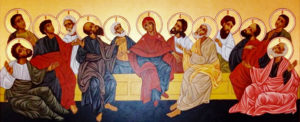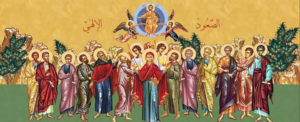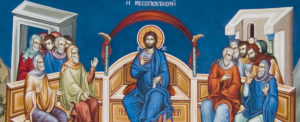Most of us who receive Communion do so on Sunday. Then afterward: Household chores, cafes, friends and so on. How can we guard and not spill the grace we receive in the Eucharist? Here are some answers from Orthodox priests:
Priest Alexei Veretelnikov, cleric of the Church of the New Martyrs and Confessors of Russia in Strogino, Moscow:
Indeed, we have to admit that in the spiritual practice of a Christian we can find a lot about the rules for preparing for Holy Communion, but very little about how we should behave after this sacrament.
But we should note that some Holy Fathers give quite interesting advice regarding activity after Communion. Thus, Saint Theophan the Recluse advises us to avoid daytime sleep so as not to fall into any unclean temptations from the evil spirits. It is known that St. John of Shanghai would spend a long time after services and Communion in church, in the altar, enjoying the feeling of unity with Christ after receiving His Body and Blood. As a young priest St. John of Kronstadt wrote about abstaining from sleeping and eating meat on the day of Communion, and in the final years of his life—about complete abstinence from food. But this is not to say that these rules should be generally followed. Moreover, in the pace of big city life for many, Sunday remains the only day when there is an opportunity to meet with their friends and enjoy good company. Of course, there is no sin in good company over a cup of tea.
But at the same time, if possible, on the day of Communion we should refrain from empty and idle pastimes and be alone with ourselves and God at least for a while. It is necessary to try and preserve inner stillness and peace as much as possible and keep a short prayer in mind, so the that mind and heart can avoid empty or, worse, sinful thoughts. We should not be distracted by worldly fuss and idle talks. Sunday requires us to do good deeds, especially on the day we take Communion. It is advisable to devote time to reading the Scriptures, prayer and works of mercy.
Being the heart of the spiritual life, the Eucharist requires that we should be vigilant and attentive to our actions, words and thoughts.
Archpriest Dimitry Vylekzhanin, rector of the Church of the Nativity of John the Baptist, Orshanka village (Yoshkar-Ola and Mari diocese):
Firstly, grace will not be lost after Communion if you treat people around you with love. Whether you are in a cafe, in a store or on the street: If you treat others with love and talk a lot, grace will not go away, but will even increase in your heart. As the Holy Fathers say, you can remain silent but be distracted in the mind, and you can speak and be in the Spirit. Thus, the most important thing is not to sin, and to remain in love. It is possible after Communion to be silent, to shut oneself up in a cell, but at the same time to sin more with thoughts than on the street or in communication with people. I think that the most important thing is to treat people with kind feelings and love.
Secondly, grace will not leave you if your mind is in Heaven. Even if physically you communicate with someone on earth, the point is not to bind your soul to earthly interests. Because if you cling to earthly things with all your heart, then, of course, grace will leave you. You must always keep prayer in your soul, and you can do anything except sin with your body and mind.
Priest George Firsov, cleric of the Church of the Dormition of the Mother of God in Veshnyaki, Moscow:
Everyone has a different kind of day: someone, for example, has to go to work after Communion. And if a person can control himself, without talking too much or engaging in silly activities, then I think he can go to work or meet with friends after the Liturgy. Of course, I would not go to a club or to places that are too noisy and directly associated with sin after Communion. And in the everyday context, why not meet with friends or spend some time in a cafe if you are in a peaceful and good mood? If you have some “animal” inside you, you will always feel bad — both after Communion and before.
Sometimes priests advise people to stay in church after Communion and help wipe the icons and clean the candlestands, but I will allow myself to joke on this topic. I think that the fathers who say this are rectors. I personally encourage everyone to go to your mother whom you have not seen for two weeks, to your grandmother, or visit someone else. You can also stay in church — this is also our family, and you should be involved in parish life. People get to know each other when they start washing floors and windows, or sorting out candles. This is helpful, too.
Hieromonk Dimitry (Pershin), cleric of the Ascension Cathedral in Alma-Ata:
Communion is participation in the Last Supper. This is communion with Christ, to Whom we became related in the sacraments of Baptism and Chrismation. That is why the priest’s prayers at the altar table are addressed to Him, albeit on behalf of all the faithful who have come to church.
And after receiving Communion we show the image of Christ’s love in this world. We fulfill the mission that God the Father entrusted to His Son to share with us. Thus, having united with Him at the Last Supper, we bear witness to the One Whom we have received in Communion, by Whom we live and Whom we serve.
We try not to spill the grace-filled joy that has touched our hearts, but to increase it in works of love, caring for the hungry, the thirsty, the sick, or prisoners. For the distance between us and God is the distance between us and those who need us. This is the great happiness of Christians — there is no need to go on a pilgrimage to get closer to God.
It is enough to take a few steps to a tired wife, a crying child, a confused old woman; to wash dishes out of turn, sweep the floor, do homework, stay off the internet, play volleyball or football with teenagers, and talk to them about the meaning of life. Finally, get to the nearest nursing home or hospice and get involved in their work.
This is not to mention reading the Word of God, for it refreshes the soul like springs in the heat.
And all this — care for those near and far, faithfulness to our word and the carrying out of our duties — can be dissolved in prayer or at least be a standing in thought before God, Who has sent into our lives the people and circumstances thanks to which we can grow to His measure. And His measure is that of the love of the Cross.
Originally in Russian at monastery.ru
Prepared by Natalia Shatova
Translation by Dmitry Lapa






